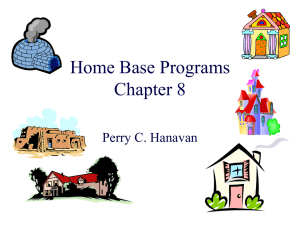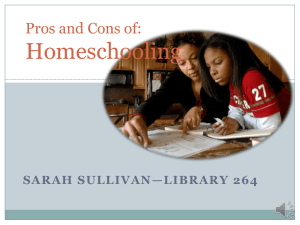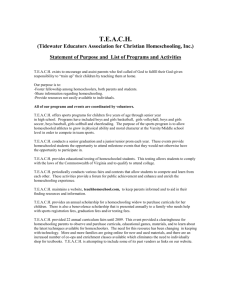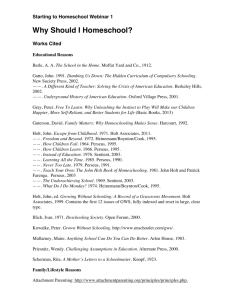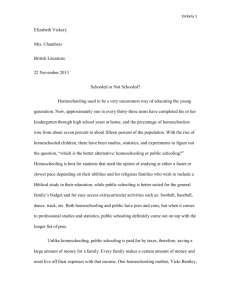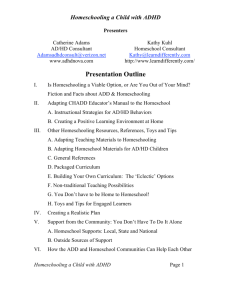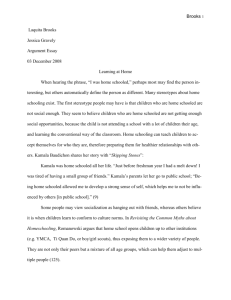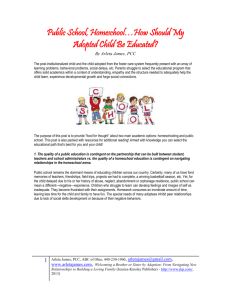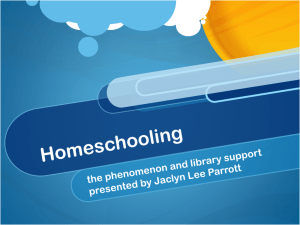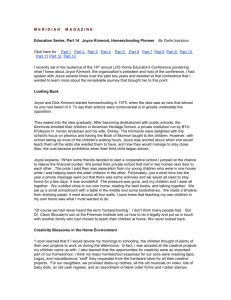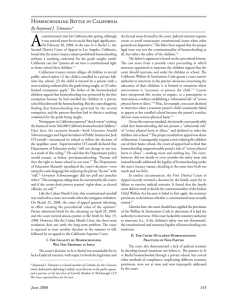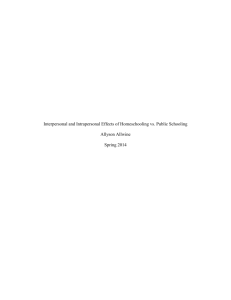Homeschooling
advertisement
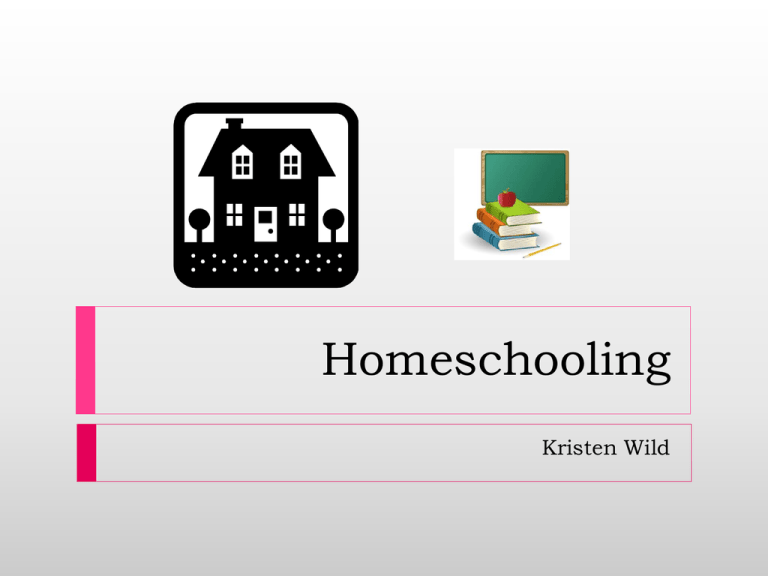
Homeschooling Kristen Wild Homeschooling To teach or be taught at home “to teach somebody at home, or be taught at home rather than in the public school system” (Encarta Dictionary) How Many Children are homeschooled? About 1.1 million in 2005 About 2% of total schoolchildren 29% increase from 1999 to 2005 Predicted that 3 million will be homeschooled by 2010 Secondary education Mid 90’s Internet Easy access to sources Connected homeschooling families Top 3 Reasons in 1996 and 1999 Give children a better education at home Religious reasons Poor learning environment at school 1. 2. 3. Low test scores and safety (drugs, peer pressure) Other reasons Special needs Want to form close relationship with child/family reasons Opportunity cost Pre- 19th century homeschooling was the norm 1970’s revival in homeschooling The secularization of public schools lead parents to send children to private schools or homeschool for religious reasons Deviant practice - truancy 1980’s parents united to establish legal rights to homeschooling Legal/political alliance plus support networks Small interest group and lobbying Homeschooling became legal in every state “Legal status with minimum regulation.” Made data collection difficult Elementary and Secondary Education Act 1994 Required full time teachers to be certified in their subject area Hundreds of thousands of calls to Congress representatives No Child Left Behind Congress made homeschooling an exception from “Revisiting the Common Myths about Homeschooling” by Michael H. Romanowski HOMESCHOOLING DOES NOT PROPERLY SOCIALIZE A CHILD SO HOMESCHOOLED CHILDREN LACK SOCIAL SKILLS *MYTH! There are some homeschooled social misfits, but there are social misfits in public school as well! Parents work hard to provide interaction with other children and activities outside the home. 98% involved in more than two activities Average of 5.2 activities Scored higher on all levels of the Piers-Harris Children’s Self-Concept Scale Girls less likely to feel insecure when their peers did not agree with their opinions/ideas HOMESCHOOLING LACKS ADEQUATE PREPARATION TO YIELD GOOD CITIZENS *MYTH! First generation 2/3 self-employed 0% unemployed or on welfare 71% regularly volunteer for a community service agency 76% voted in the last election (vs. 29%) 81% involved in a community organization (vs. 50%) 94% believed that being homeschooled made them independent 79% say that it helped them interact with diverse groups of people HOMESCHOOLED CHILDREN DO NOT HAVE A DIFFICULT TIME GETTING INTO COLLEGE AND HANDLING THE ACADEMIC CHALLENGES *TRUTH! Hundreds of colleges and some ivy leagues give homeschoolers information for admission and financial aid Some have special admission process Actively recruit homeschoolers Score above or at national average on standardized tests ACT 1997 superior in English and reading and overall composite score Same with logic/mathematical MOST PEOPLE HOMESCHOOL ONLY FOR RELIGIOUS REASONS M Y T H ! Part-time Homeschooling Increasing in popularity Arizona Kyrene school district CASA Vida (Community-Assisted Schooling Alternatives) 6 hours a week Access to library & other community resources Enrichment Trust …in North Carolina NC state Constitution Only full time public school students have access Every child has “equal access” and “an opportunity to receive a sound basic education” in public school” (Plecnik 2007). Excluded from athletics and core classes Testing ground Pay taxes! Discussion Any questions? Were you homeschooled or know someone that was homeschooled? Share your experiences. Before our presentation, did you believe in any of the myths? Did you learn anything that you would like to share with others? References Eley, M.G. (2002). Making the homeschool connection. Educational Leadership, 59(7), 54-56. Homeschool. (n.d.) In MSN Encarta Dictionary online. Retrieved March 27, 2009, from http://encarta.msn.com/dictionary_/homeschool.html Isenberg, E.J. (2007). What have we learned about homeschooling? Peabody Journal of Education, 82, 387-409. Plecnik, J.T. (2007). Equal access to public education: An examination of the state constitutional & statutory rights of nonpublic students to participate in public school programs in a part time basis in North Carolina & across the nation. Texas Journal on Civil Liberties & Civil Rights, 13(1), 1-30. Continued Romanowski, M. H. (2006). Revisiting the common myths about homeschooling. Clearing House, 79(3), 125-129. Stevens, M. L. (2003). The normalisation of homeschooling in the USA. Evaluation & Research in Education ,17, 90-100. Sorey, K. & Duggan, M.H. (2008). Homeschoolers entering community colleges: Perceptions of admission officers. Journal of College Admission, 200, 22-28. Wichers, M. (2001). Homeschooling: Adventitious or detrimental for proficiency in higher education. Education, 122(1),145-151.
